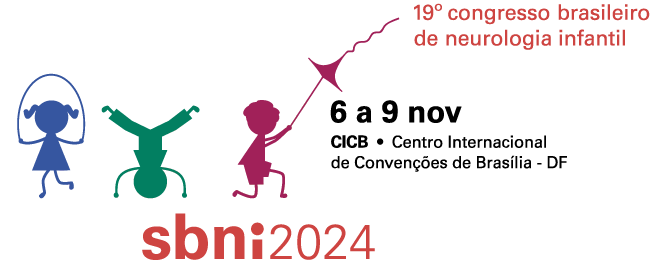Dados do Trabalho
Título
A MUTATION IN LRRK2 GENE CLINICALLY PRESENTING AS DOPA-RESPONSIVE DYSTONIA IN A 7-YEAR-OLD MALE
Apresentação do caso único
Case Presentation: A 7-year-old male student, previously healthy, presented to our service at 5 years old due to frequent falls and gait alterations characterized by marked, asymmetric dystonia with fluctuations over time. Symptoms were more pronounced on the right limbs and improved when walking backwards. He had previously consulted other services without clinical improvement. Initial screenings for Wilson's disease and rheumatological disorders, along with cranial MRI with tractography and spectroscopy, were normal. The hypothesis of dopa-responsive dystonia (DRD) was made and therapy with levodopa was initiated, resulting in significant improvement in the patient's quality of life and regain of walking ability. However, the genetic panel for neurodevelopmental and movement disorders did not reveal alterations in genes traditionally associated with DRD. Whole exome sequencing was subsequently requested, revealing a likely pathogenic mutation in heterozygosity in the LRRK2 gene (Gly2019Ser), inherited in an autosomal dominant manner. The patient continued to exhibit some symptom fluctuation, with no signs of parkinsonism, except for a slight tremor in the left hand, and demonstrated good response to levodopa.
Discussão
Discussion: Dopa-responsive dystonia is characterized by dystonia with good response to low doses of levodopa and is typically associated with mutations in the GCH1 gene. The LRRK2 gene, which encodes a kinase with significant brain activity, is not conventionally listed among the genes associated with DRD, but rather with Parkinson's disease type 8. Parkinsonism related to LRRK2 manifests similarly to idiopathic Parkinson's disease and typically affects older patients, although there are reports of symptom onset around the age of 20. However, at least one report in the literature has linked LRRK2 mutations to the presence of generalized dystonia in an adult patient. No other findings in the exome could explain the clinical picture presented by this patient, making it reasonable to correlate the clinical findings with the mutation found in LRRK2.
Comentários finais
Conclusion: With advancements in genetic sequencing techniques, it is expected that our understanding of established genes will increase exponentially. Although mutations on LRRK2 are traditionally linked to parkinsonism in older patients, the case presented suggests a possible clinical-genetic correlation between a dopa-responsive dystonia in a child and a likely pathogenic mutation in the LRRK2 gene.
Referências
Referências:
1. Weissbach A, Pauly MG, Herzog R, Hahn L, Halmans S, Hamami F, Bolte C, Camargos S, Jeon B, Kurian MA, Opladen T, Brüggemann N, Huppertz HJ, König IR, Klein C, Lohmann K. Relationship of Genotype, Phenotype, and Treatment in Dopa-Responsive Dystonia: MDSGene Review. Mov Disord. 2022 Feb;37(2):237-252. doi: 10.1002/mds.28874.
2. Taymans, JM., Fell, M., Greenamyre, T. et al. Perspective on the current state of the LRRK2 field. npj Parkinsons Dis. 9, 104 (2023). https://doi.org/10.1038/s41531-023-00544-7
3. Saunders-Pullman R, Raymond D, Elango S. LRRK2 Parkinson Disease. 2006 Nov 2 [Updated 2023 Jul 6]. In: Adam MP, Feldman J, Mirzaa GM, et al., editors. GeneReviews® [Internet]. Seattle (WA): University of Washington, Seattle; 1993-2024. Available from: https://www.ncbi.nlm.nih.gov/books/NBK1208/
4. Díaz-Feliz L, Feliz-Feliz C, Del Val J, Ávila-Fernández A, Lorda-Sanchez I, García-Ruiz PJ. Generalized dystonia without Parkinsonism in an LRRK2 carrier. Clin Park Relat Disord. 2022 Jul 21;7:100157. doi: 10.1016/j.prdoa.2022.100157.
5. Marras C, Schüle B, Munhoz RP, Rogaeva E, Langston JW, Kasten M, Meaney C, Klein C, Wadia PM, Lim SY, Chuang RS, Zadikof C, Steeves T, Prakash KM, de Bie RM, Adeli G, Thomsen T, Johansen KK, Teive HA, Asante A, Reginold W, Lang AE. Phenotype in parkinsonian and nonparkinsonian LRRK2 G2019S mutation carriers. Neurology. 2011 Jul 26;77(4):325-33. doi: 10.1212/WNL.0b013e318227042d.
Palavras Chave
LRRK2; dystonia; parkinsonism
Área
Transtornos do movimento
Autores
JOANA MORAES DE REZENDE, ISAIAS SOBRAL SOARES, CAMILA OTONI NEVES JEANGREGÓRIO, PALOMA VIEIRA PIRES, GABRIELE MARIA FIOROTTO SILVÉRIO, PATRICIA SELESTRINI, FERNANDA DOS SANTOS RIBEIRO, SARAH FALCÃO BRASILEIRO HENRIQUES, FLAVIA NARDES DOS SANTOS
